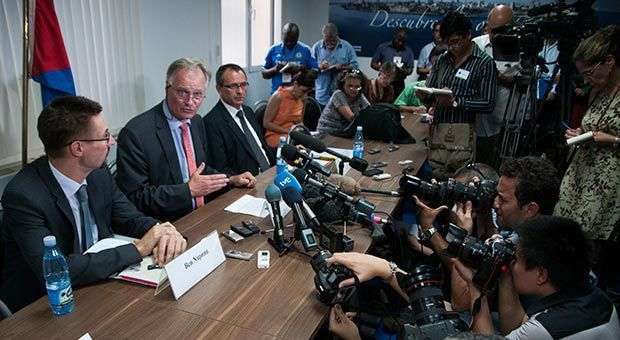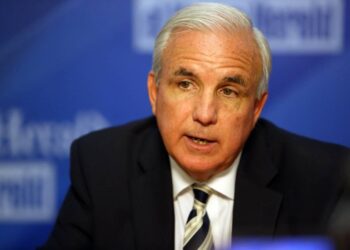The first round of “fruitful” negotiations for a Political and Cooperation Dialogue Agreement for normalizing bilateral relations, which would be the coup de grâce for the Common Position, was concluded in Havana.
After two-days talks, Cuba and the European Union (EU) agreed a course for the negotiations of a Political and Cooperation Dialogue Agreement, which, if successful, would provide legal support to bilateral relations which have been atypicalso far and would constitute the last stroke to the so-called Common Position, the unilateral political instrument of the group of 28 nations that controls the linksbetween both parts since 1996.
From Tuesday through Wednesday, representatives of the EU met behind closed doors in Havana to set the foundations and principles that would guide the negotiations of the Political and Cooperation Dialogue Agreement.
At the end of this first meeting, the general director for America from the European Foreign Action Service, Christian Leffler,stated during a press conference at the EU’s venue in Havana, that along with the Cuban counterpart chaired by Abelardo Moreno Fernandez, Vice minister for Foreign Affairs, they reached an consensus on the main aspects to be included in the bilateral instrument they are pointing at.
The Cuban Foreign Affairs Ministry restated the above in a press release published in its website: “we have outlined the course of negotiations and other organizational and communication issues between the parts in favor of the development of this process”.
In the press release, the Cuban part noted that the exchanges held in this round of negotiations were“constructive and positive”, whereas the head of the European negotiation team affirmed these were “fruitful”.
This is the first meeting held between Havana and Brussels since Cuba accepted,in March,a proposal by the high representative of the EU for Foreign Affairs and Security Policy, Catherine Ashton —made on February 10th– with the purpose of retaking negotiations for normalizing bilateral relations.
Leffler, who was accompanied by European officials Ben Nupnau and Jose Soler Carbo, assured to feel confident in that “we can move towards a solid, ambitious and positive agreement in the current situation by focusing on the essence and the objectives Cuba and the EU share”.
As said by the head of the European part, the agreement will be based on political and governmental dialogue, cooperation and policies by sectors, and economy and trade and; it will include a section on bilateral relations.
In his statements to the national and international credited press in Havana, he talked about “a common vision of the main objectives” and many other points in common between Cuba and the EU.
Nonetheless, Leffler also acknowledged discrepancies mainly based on the interpretations of human rights.
Cuba is the single Latin American nation that has not signed a Political and Cooperation Dialogue Agreement with the EU and one of the few countries in the world in that same situation.
This is mainly due to the fact that the EU has conditioned dialogues to certain demands for political change in Cuba, which is reflected in the Common Position approved by European executives as a suggestion by the Spanish president at the time, Jose Maria Aznar. That’s the reason why, bilateral relations between Cuba and the EU have been so strained.
However, the negotiation on the Political and Cooperation Dialogue Agreement will take place with the Common Position still in force. This issue was not tackled at this stage of negotiations, Leffler added.
“The Common Position is still in force in the EU. We were all aware of the fact that would not change at the beginning of negotiations. We have not discussed the issue of the Common Position at this stage of negotiations”, he assured.
Havana did not mention that restrictive police in its press release on Wednesday.
By undertaking negotiations aware of the fact that the Common Position is still in force, Cuba showed its pragmatic stand and its confidence in that Aznar’s project would literally die if the European governments don’t make reference to that unilateral instrument and the Political and Cooperation Dialogue Agreement is signed. The EU would have no reason for bringing it back to life.
The Common Position states that as long as Cuba does not undertake the changes demanded by the EU, bilateral relations will not be normalized. Yet, Havana has singed agreements with more than half of the European states. Besides, European cooperation has progressed.
The French Foreign Secretary, Laurent Fabius, noted during his recent visit to Havana –the first one of a French Minister of Foreign Affairs in 31 years– that “there are no irreconcilable differences”, which is a sign of the EU’s interest in having more influence in Cuba.
Shortly after, the Portuguese State Secretary for Foreign Affairs, Luis de Campos Ferreira, also travelled to Cuba and expressed the interest in moving on in terms of bilateral relations in all fronts, considering Cuba is becoming more attractive due to the changes in the economic sector, mostly as to foreign trade and investment.
Leffler pointed out that that the future agreement would serve as “platform for better understanding” differences and for “identifying steps towards convergence”.
In response to a question by the press on preconditions by the EU he stated he said: “we want to reach an agreement” and “preconditions and impositions are not positive”, but they did come with “expectations”.
This takes place in the midst of the reforms Cuba is implementing in order to update its economic and social system, an endeavor we are willing to support, Leffler expressed.
“Given the current changes and efforts Cuba is undertaking, the EU has an important role to play, based on its own experiences and opportunities for Cubans and Europeans in strengthening cooperation”, affirmed Brussels’ representative.
The Cuban Foreign Affairs Ministry stated that the next round of negotiations will be held in Brussels and the date will be agreed upon through diplomatic channels,.
Regarding the duration of the process of negotiations, Leffler explained that “it is still too early” to set a date, and made emphasis in that “most importantly” they need to move on in gaining mutual trust, respect and understanding.
By: Jorge Luis Rodríguez González










